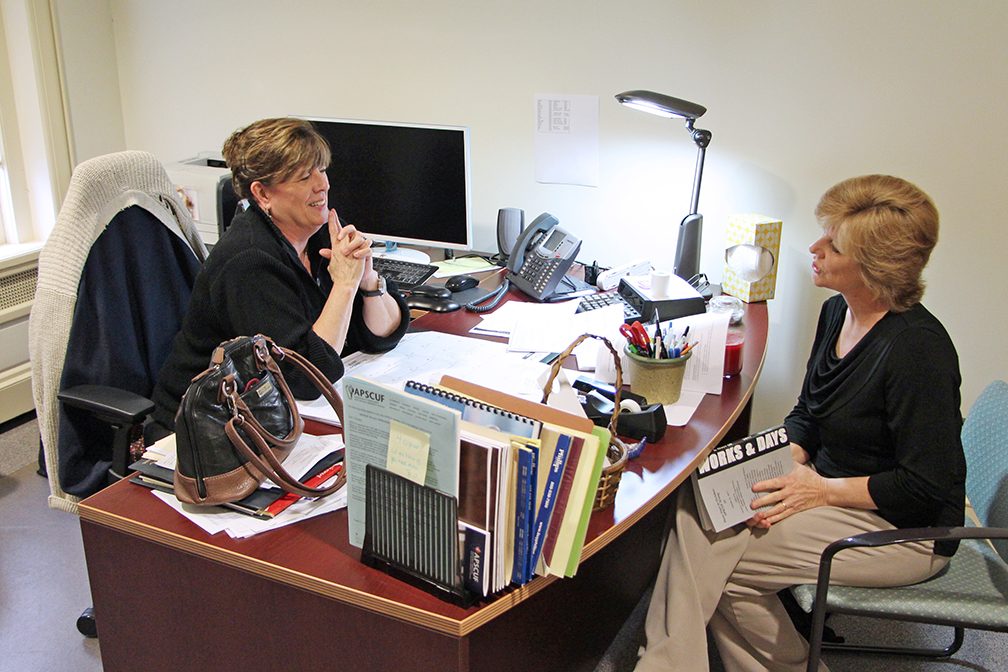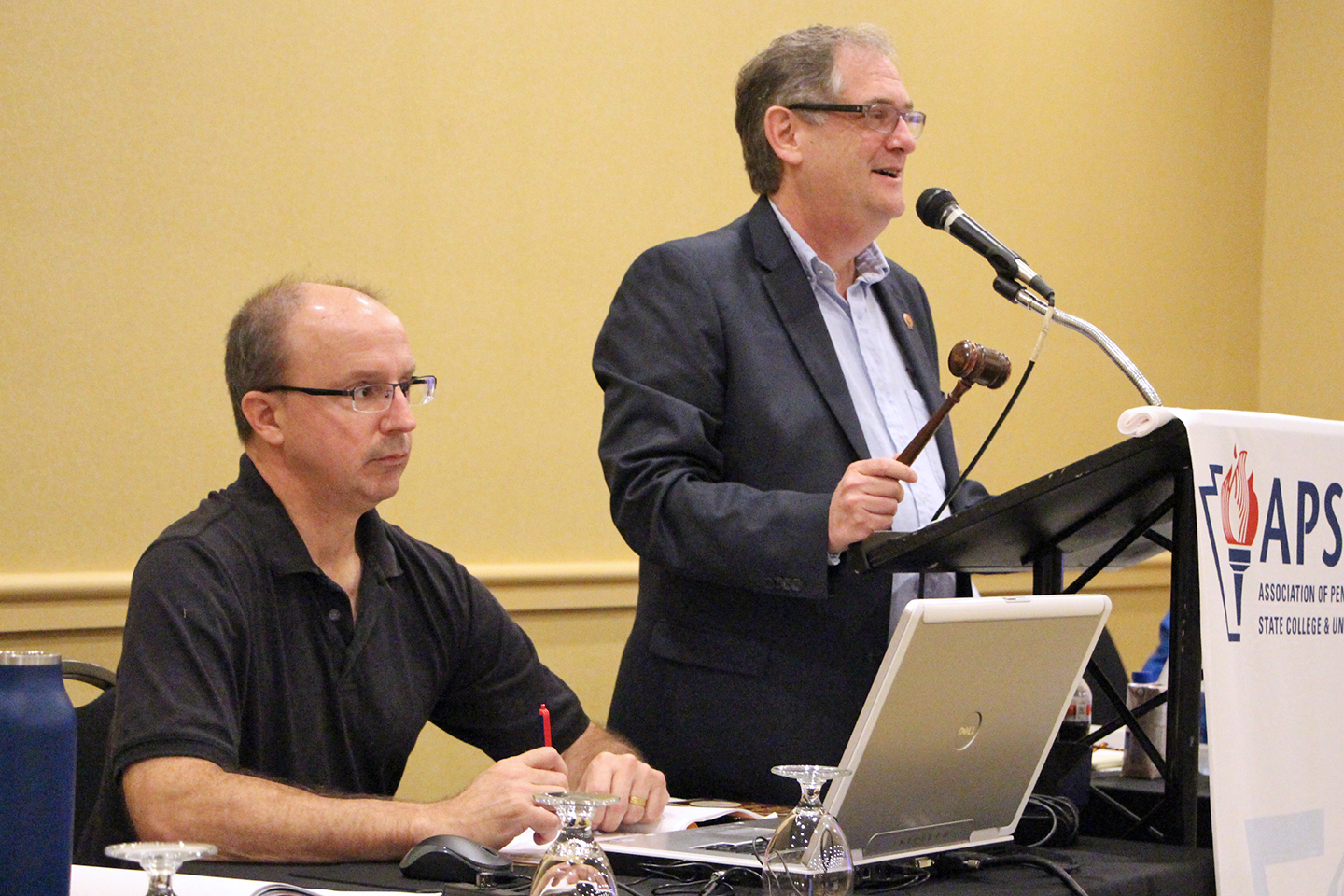Blog
APSCUF welcomes new membership-benefits specialist

Last week, we welcomed Bim Arthun, right, State APSCUF’s new membership-benefits specialist. She will spend the next few weeks learning from Nancy Koutris, left, who will retire after 36.5 years with the association.
One more chance to watch for APSCUF this season

Photo/Pixabay
Watch for two APSCUF members in the final SPORTSfever broadcast of the season: the football contest between East Stroudsburg and Clarion universities, beginning noon Saturday, Nov. 10. Featured members will be Sandy Miller, women’s field hockey coach at East Stroudsburg University; Colleen Shotwell, athletic-training coordinator at East Stroudsburg University; and James L. Thornton, Clarion University’s head athletic trainer. The appearances during televised football, soccer, and field hockey games have been part of APSCUF’s sponsorship of the college-sports network. Broadcasts also include an APSCUF commercial and the APSCUF logo.
Click here for a list of all SPORTSfever games and information about where to watch.
Basketball, softball coaches on SPORTSfever this weekend

Photo/Pixabay
Watch for Susan Kocher, head softball coach at Bloomsburg University, and Mary Fleig, women’s basketball coach at Millersville University, during the Millersville at Bloomsburg PSAC football telecast 3 p.m. Saturday, Oct. 27. Their appearances are part of APSCUF’s sponsorship of the college-sports network SPORTSfever. Broadcasts also include an APSCUF commercial and the APSCUF logo. Click here to see the fall SPORTSfever schedule and information about how to watch. Interested in appearing in a SPORTSfever broadcast? Email .
Read Dr. Jamie Martin’s remarks to the Board of Governors – Oct. 11, 2018
APSCUF Vice President Dr. Jamie Martin’s comments as prepared:
Chancellor Greenstein, Chairwoman Shapira, governors, university presidents, and guests,
Good morning. My name is Jamie Martin, I am professor here at IUP in the department of Criminology and Criminal Justice, and I am the vice president of the Association of Pennsylvania State College and University Faculties (APSCUF), which represents the faculty and coaches at our 14 great universities.
I would like to take this opportunity to welcome all of you (except for Dr. Driscoll) to our beautiful campus. I hope that you have had, or will have, some time to take a stroll through our Oak Grove and to see all that is happening at IUP. It truly is a beautiful campus.
On behalf of our membership, I would like to take the opportunity to thank all of you for the time and energy that you put forth in trying to improve the lives of our students and striving to fulfill the mission of our system: to provide a high-quality, affordable education for them.
I also wish to speak on behalf of our membership in welcoming Dr. Dan Greenstein. Dr. Greenstein, I think that you witnessed, when you spoke at the APSCUF legislative assembly a couple of weeks ago, the hope and excitement that the faculty displayed as you gave your remarks. I know that you heard that we appreciate many things related to your leadership: your vision for our universities, your transparency, and your willingness to be inclusive and recognize the talents of the faculty and coaches at our 14 universities. We appreciate the willingness of you and the Board of Governors to show a commitment to making contract negotiations less contentious, and we are pleased that you have included us in numerous committees that are examining challenges facing our universities and the State System. We are very hopeful that the leadership style that you have thus far displayed will continue well into the future.
I also see common ground in our views of our students. In your recent blog, you spoke very eloquently about the wonderful students that we have at our universities. One of the great joys of my life is walking into a classroom and interacting with my students. I see the same things that you do. I see talented, committed students who are engaged and eager to learn. I have had the opportunity to teach some of the same students in their freshmen year and four years later in their senior year. I am always amazed at the transformation in them because of what they have experienced in the classroom and outside of it. And I have had the opportunity to interact with our alumni and hear about how the education that they received at IUP prepared them for their careers. As you noted, a student at Lock Haven pointed out that our students attend our universities because they want to help others. Most of the alumni that I have the pleasure of speaking with are doing just that … .and they love to return to their alma maters.
I also see common ground in our concerns about the challenges that our students face as they work on completing their college degrees. You have heard when you meet with students their concerns about the financial and other challenges that they face. I have had personal conversations, often during office hours, with young men and women who talk to me about trying to juggle working two jobs with trying to find time to study, being unable to afford books for their classes, and wondering how they will pay rent, purchase food, etc. These are heartbreaking stories to hear. We all have to do better by our students.
We share the concerns that you have articulated and, it seems, that you share ours. We all know how critical funding from the state legislature is, and we believe that we together, the State System and APSCUF, can more effectively argue for additional state funds when we are rowing together against the tide rather than rowing separately.
We stand ready to work together with you, to do what we can to improve the lives of our students and to participate in helping to solve the challenges that face our universities. We hope that you and all the university presidents will include — and rely on — their faculty to assist in these ambitions.
Thank you very much for your time.
New State parliamentarian shares why he took the job

Dr. Tim Madigan, left, oversees proceedings in his first legislative assembly as State APSCUF parliamentarian. Also at the September assembly is APSCUF President Dr. Kenneth M. Mash. Photo/Kathryn Morton
Dr. Tim Madigan, APSCUF’s new State parliamentarian, completed his first legislative assembly at the head table in September. The Mansfield University associate professor shared what being a parliamentarian in APSCUF means to him.
Madigan, a Williamsport native, expressed the importance of higher education. Being a graduate of Bloomsburg University as well as Penn State University allowed for his success, he said. Affordable higher education is an important stepping stone for middle-class students, he added.
Madigan accepted the parliamentarian position to be more involved within APSCUF, which provides professors with support in issues and problems they are facing. He shared that working with the amazing people that make up this union — including President Dr. Kenneth M. Mash, Vice President Dr. Jamie Martin, and all of the members of APSCUF — is important.
“It’s a combined effort of many wonderful people.” Madigan said.
He expressed the significance of supporting unionized organizations and keeping APSCUF strong and effective.
“Corporate conservatives are trying to take control of public higher education without any concern if it will work,” he said. He said he wants to be the person to stand up to preserve and strengthen unions.
For the upcoming year, Madigan wants to focus on membership. He also wants to keep an eye out for the struggling smaller schools, such as Cheyney and Mansfield universities, and for any negative changes on the political landscape.
He said he believes his most important duty in this position is to keep the legislative assembly on track and running smoothly. He will be a part of the rules and bylaws committee, and advise the chair on procedures. He will also ensure the assembly will follow the correct rules.
Madigan was the APSCUF membership chair at Mansfield University, vice president of Mansfield University’s APSCUF chapter, and served as interim president after Dr. John Mansfield passed away in January. Madigan said he wants to continue Mansfield’s efforts within his position in APSCUF.
Madigan said he believes his field of studies will benefit him enormously. He teaches as a sociologist, studied political sociology and social stratification, and has done extensive research on inequality in the U.S.
Mash said he has total confidence in Madigan as the new parliamentarian.
“I think he’ll be great,” Mash said. “He is a very loyal APSCUF member.”
Madigan’s past positions and bright mind will be a great asset to the board, Mash said.
When Madigan is not at work, his loves archery hunting through the mountains and gamelands of Pennsylvania. You can find him fishing for small bass in the Susquehanna River or listening to Irish music on his motorcycle. Madigan has traveled to almost half of China within the last 20 years and loves to explore unfamiliar destinations.
—Sydney Miller, APSCUF intern